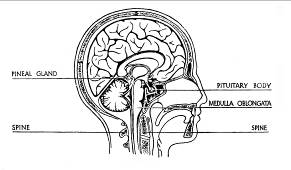Melatonin Is Not A Sleeping Pill
Melatonin is a cheap dietary supplement which is easily available over the counter. It is something that triggers your mind to tell you it is time for bed. On scientific grounds, melatonin is secreted by your pineal gland deep in your brains. When released, melatonin binds to the receptors responsible for your circadian rhythm, and from there it crosses the brain blood barrier to enter the cerebrospinal fluid.

What is the circadian rhythm?
Have you ever noticed that you tend to feel drowsy or energized around the same time every day? This is because you have your circadian clock – a biological process where your mind is adapted at doing a specific task like sleeping, waking up sharp at 6 o’clock without the help of an alarm clock or eating at noon sharp.
Melatonin in your body
The secretion of melatonin begins around two hours before bedtime. That’s typically around 9 pm. You are now probably going to sleep at that time, but it is just that your biological clock has started to snooze to tell you the time to sleep is about to begin. You start yawning and feeling tired. Melatonin may be at its peak at around 2-3 am when you are deeply asleep and this is when your body is recovering and automatically fine-tuning your metabolism, repairing muscles, detoxifying organs among so many other functions. In the morning melatonin is at its lowest level meaning that it is time to wake up!
Have you ever heard your grandparents complaining that they are having trouble sleeping? Well, when old age sets in, the pineal gland produces less and less melatonin. And, that’s where the dietary supplement comes in the rescue of their sleep.
Two types of melatonin – synthetic & natural
Synthetic melatonin is developed in laboratories while the natural one is extracted directly from the pineal glands of animals like cows. Both synthetic and natural can be mixed, and no matter the method of production, melatonin remains melatonin.
Uses of melatonin
It is the first drug of choice for anyone suffering from minor sleep disorders – jet lag, shift work. It is available without any prescription and considered safe for human consumption.
But it will not help insomnia cases for which a psychiatrist will have to prescribe specific medications.

How much melatonin is needed?
It is not regulated and there is insufficient or inaccurate information on the bottle about its dosage and strength. A study conducted by Massachusetts Institute of Technology in 2001 stated that 0,3 mg of melatonin was sufficient to restore peaceful sleep in healthy adults. However, in pharmacies and stores, you will find the melatonin product is available in various doses from 3, 5 to 10mg.
How long does melatonin stay in your system?
The plasma life of melatonin is quite short – around 20 to 50 minutes. This means that there could be no advantage of taking a higher dose before bed.
You may be better off at taking the time release tablets to benefit a maximum of undisturbed sleep. For example, a popular brand – Natrol Melatonin ADVANCED SLEEP contains 10 mg tablets with a unique 2-layer technology that controls the release of melatonin to aid at maintaining healthy sleep. A brief product overview says that the outer layer first releases melatonin quickly to help you fall asleep fast. It further says the inner layer gradually releases melatonin slowly to help support healthy sleep.
When to take melatonin?
Melatonin is a hormone that needs around 30 minutes to start kicking in. So it would be recommended to take it at 8.30 if you are aiming to go to sleep at 9.
On a cautious note, for those of you who have an active sexual life before going to bed, I would advise you to take melatonin only after having intercourse. You don’t want to feel sleepy mid-way.

Can I take melatonin during the day?
No, it does not work this way. You also don’t need to take melatonin if you are awake in the middle of the night, as another pill may not help. This is because melatonin is not a sleeping pill! It is just an aid to help your pineal gland indicate bedtime. If you want to fall asleep at some specific time because of some stress or personal reason, ask your psychiatrist to prescribe specific drugs or sleeping pills.
Can I take more melatonin to increase my chances of a better sleep?
No, you can’t. What you should know is that melatonin is a sleeping assistant, not a cure for sleeplessness. It won’t be more effective when you go over the recommended dose. You will, in fact, be stressing you kidneys unnecessarily as some of these melatonin dietary supplements often contain around 20mg of calcium. If you already have a diet rich in calcium, too much calcium will damage your kidneys!
In a study conducted In 2005, Massachusetts Institute of Technology found that high doses of melatonin are effective for just a few days in the beginning. After that, the impact stops.
There are certain instances where melatonin resulted in grogginess that can be felt in the morning. You can go through the testimonials here.
The bottom line
Melatonin is a legal over the counter food supplement. It is here to tell your brain that it is time to sleep. It, however, does not help in overdosing or fighting insomnia or sleep disorders due to some illnesses. Taken from time to time at a reasonable dosage, melatonin can help you doze off quicker and sleep better by going through all the sleep cycles respectively.




9 Responses
[…] during the day and fall asleep at nightfall, it is not by chance; a hormone produced by our body, melatonin, is responsible for our […]
[…] Melatonin Is Not A Sleeping Pill […]
[…] Stop! Melatonin Is Not A Sleeping Pill; […]
[…] – Melatonin Is Not A Sleeping Pill; […]
[…] – Melatonin Is Not A Sleeping Pill; […]
[…] – Melatonin Is Not A Sleeping Pill; […]
[…] – Melatonin Is Not A Sleeping Pill; […]
[…] – Melatonin Is Not A Sleeping Pill; […]
[…] – Melatonin Is Not A Sleeping Pill; […]